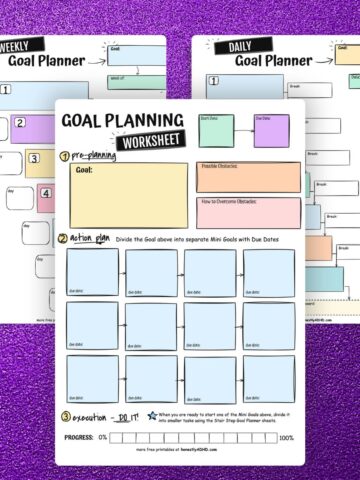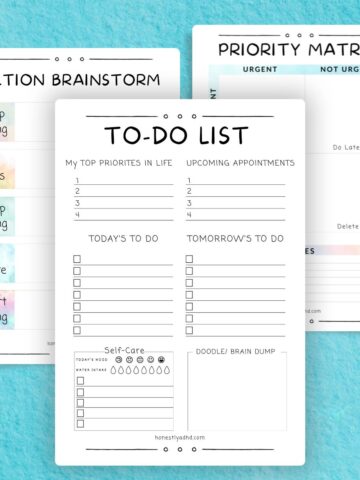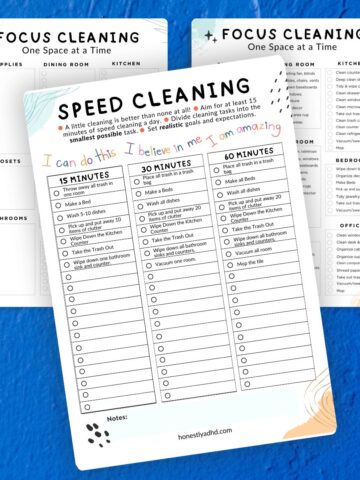The content on this website is for informational purposes only and is not meant to replace professional or medical advice. See our full disclaimer.
ADHD people are often impulsive. We tend to act or speak without fully thinking through all the implications of doing so.
If you're an adult with ADHD or a parent of an impulsive ADHD child, you know that the world we live in often views impulsivity as trouble!
So, to answer the question, ‘is it out of our control?’ when referring to impulsivity in the ADHD brain: to an extent, yes. However, there are things you can do to support yourself and understand your brain better.
Jump to:
Imbalanced Hormone Levels and Impulse Control
Although seen more commonly in the hyperactive-impulsive type, impulsivity can be found in all types of ADHD (hyperactive-impulsive type, inattentive type and combined type). To understand why impulsivity is one of the core symptoms of ADHD, we need to first understand the science.
A complex system of hormones in the human brain (including the two ‘happy’ hormones, serotonin and dopamine) plays a pivotal role in how we make decisions on what to do.1Dopamine and Seratonin: Our Own Happy Chemicals
These hormones, simply put, reinforce the behaviors that make us feel good.
In a neurotypical person, those hormone levels are balanced: there is the right amount of dopamine to help you get a task done and the right amount of serotonin to feel satisfied with what you’ve achieved.
This balance means neurotypical people will tend to have an easier time with impulse control, resisting impulsive thoughts and avoiding rash decisions.
In the ADHD brain, levels of serotonin and dopamine are unbalanced, which can lead to high levels of impulsivity.
Dopamine deficiency in the ADHD brain means we don’t get that ‘go’ signal to start a task: even something as ordinary as brushing our teeth will feel impossible to initiate.
What leads to Impulsivity in ADHD Brains?
You may hear the term ‘dopamine chaser’ in reference to someone with ADHD. Due to our unbalanced ‘happy’ hormones we tend to actively seek out ways to get that hit of dopamine we don’t get naturally (aka ‘chasing the dopamine’).
It is also thought the ADHD brain has lower levels of serotonin receptors (the ‘stop’ signal which enables us to resist an impulse). So, when dopamine is released, we are much more sensitive to this flooding of ‘go go go’ leaving us with a weakened impulse control mechanism and higher levels of impulsivity.
One study showed that when dopamine is released in the ADHD brain, the hormone level is even higher than in the less impulsive, neurotypical brain.2Dopaminergic Network Differences in Human Impulsivity
A sudden increase in dopamine can make individuals with ADHD feel overwhelmed. This feeling pushes them to quickly act on what caused this increase, leading to impulsive behavior.
Impulsive Traits in ADHD
ADHD is something you are born with and have your whole life: ADHD children grow into ADHD adults.
But remember that impulsive behavior itself is not wrong on an absolute scale. There are times when acting impulsively and quickly are vital, such as avoiding a physical hazard or warning others of imminent danger.
In fact, a common personality trait among ADHD adults is the ability to think on their feet and perform well in stressful situations.
However, in general, our society prefers a more measured, considered approach that is just not how our brains work.
Examples of impulsive behavior in ADHD children:
- Blurting out answers in class
- Interrupting others when they’re speaking
- Losing friendships because of impulsive comments
- Making careless mistakes in schoolwork
- Taking risks with no regard for the outcome
- Emotional outbursts
Examples of impulsive behavior in ADHD adults:
- Engaging in risky behaviors without assessing consequences
- Impulse buying or spending
- Unsafe driving
- Career self-sabotage
- Making last minute decisions without planning
Emotional Dysregulation and Impulsivity
A common symptom of ADHD - also seen in autism spectrum disorder - is difficulty dealing with strong emotions leading to emotional outbursts (or meltdowns) and emotional impulsivity.3Emotional dysregulation stats
This is due to the decreased ability to control and regulate emotions.
Emotional dysregulation may look like:
- ‘Overreaction’ (by neurotypical standards) to something seemingly small or insignificant
- Quick to anger or ‘going from 0-100'
- Strong emotional reactions to perceived rejection (known as Rejection Sensitivity Dysphoria)
- Mood swings
Dopamine Flooding
A recent study found a possible link between ‘dopamine flooding’ and emotional escalation: events that trigger intense emotions may also trigger the release of higher amounts of dopamine.4The link between emotional escalation and dopamine flooding. So, it is possible that our impulsivity may be linked to the differences we experience in emotional regulation.
Despite many individuals reporting difficulties with regulating emotions and their relationship with impulsivity, there are debates about how emotional dysregulation relates to ADHD (it is not an official listed symptom in the diagnostic criteria).
One theory suggests emotional dysregulation is a core trait of ADHD and stems from the same differences in the prefrontal cortex and nervous system that cause differences with impulse control, executive function and working memory.5The prefrontal cortex and regulating emotions in ADHD
Another suggests emotional dysregulation is a separate condition that comes from different but overlapping changes in the brain and nervous system.
Either way, there is no denying many ADHD folks struggle to regulate their emotions, and this can have a big impact on how impulsivity presents itself.
ADHD Impulsivity and Mental Health
Both children and adults with ADHD are often branded as irresponsible, thoughtless, and erratic; their impulsive actions seen as a choice or some inherent moral failure rather than a neurological difference due to their diagnosis of ADHD.
This is an unfair characterization based on stereotypes, lack of understanding and ableism.
Those with ADHD, particularly those showing traits of impulsiveness, do no choose to be impulsive. In fact, these sorts of behaviors can often have a negative effect on the individual's mental health, self-esteem and even safety.
Being stigmatized and not understanding what is going on in your own brain (whilst simultaneously being told to just ‘get on with it’ by family members) weighs down on the ADHDer and eventually takes its toll. This can lead to substance abuse, psychiatric disorders, self-harm and even suicide.
Adults with ADHD have an increased risk of suicidal thoughts.6Suicide and ADHD This risk factor is even higher if the individual also has comorbid depression. Mixed with impulsiveness, this is a dangerous cocktail.
Even amongst healthcare professionals ADHD is sometimes misdiagnosed - often as personality disorders, mood disorders or anxiety disorders. Or it's brushed off as other mental health conditions.
For this reason, many people go undiagnosed for decades often leading to comorbid disorders such as depression, anxiety and CPTSD.
Living in a world not made for you is harmful to your mental health; we live in a society that favors the neurotypical.
Add to this being misunderstood, stigmatized, and sometimes dismissed by the same professionals that are supposed to help you, and it’s no surprise that so many ADHDers struggle with their mental health.
Supporting Your Impulsive ADHD Brain
Knowing all of this, it is crucial to be aware of the things you can do to support yourself and how you can seek support from others.
Stimulant medications
ADHD medications can only be obtained by medically diagnosed individuals and must be used under the guidance of a mental health professional.
If you choose the medication route, you should discuss with your GP as well as doing your own research.
Therapy
Cognitive behavioral therapy (CBT) and dialectical behavioral therapy (DBT) are often suggested for those with ADHD.7ADHD and therapy It is however important to note that therapy alone does not treat the core symptoms of ADHD, rather provides the individual with support around time management, emotional regulation skills and negative thought patterns.
Physical activities
Regular exercise can help support the overactive ADHD brain. It’s used by many ADHDers as they feel it provides clarity, structure and a way to burn off excess mental energy.
Self-care
This means prioritizing time for relaxation, engaging in hobbies or activities that bring joy and relaxation, and ensuring adequate sleep and a nutritious diet. These practices allow impulsive people to pause, reflect, and make more considered decisions, thereby reducing impulsive actions.
Support groups
There are many groups, both in person and online, that you can join: they provide a safe place to connect with other ADHDers and feel seen and heard.
Friends and family
If you are reading this as the friend or family member of someone with ADHD, although they may not ask directly, they need and will benefit from your support.
This could be as simple as learning more about ADHD, being more patient or simply asking what they need.
Final Words
Above all it is important to recognize that your impulsivity does not make you a bad person, nor is it something that needs ‘curing’.
We must prioritize our well-being instead of believing we are flawed. Failing to recognize this can harm our mental health as we continually try to be someone we're not.
To learn more about the use of ADHD medication, therapy or any other forms of support, the best place to start is by speaking with your GP.
References:
- 1
- 2
- 3
- 4
- 5
- 6
- 7






We'd love to hear from you